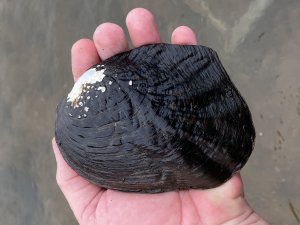Presented By: Ecology and Evolutionary Biology
EEB Thursday Seminar (Hybrid): Gene duplications as a source of innovation in freshwater mussels
Rebekah Rogers, Associate Professor, Department of Bioinformatics and Genomics, UNC Charlotte

Our weekly seminar series featuring internal and external speakers in the field of ecology and evolutionary biology. This seminar will be in-person and livestreaming on Zoom (link this page).
Abstract
Freshwater Unionid bivalves have recently faced ecological upheaval through pollution, barriers to dispersal, human harvesting, and changes in fish-host prevalence. Currently, over 70% of species are threatened, endangered or extinct. To characterize the genetic response to these recent selective pressures, we collected population genetic data for one successful bivalve species, Megalonaias nervosa. We identify megabase sized regions that are nearly monomorphic across the population, a signal of strong, recent selection reshaping genetic diversity. These signatures of selection encompass a total of 73Mb, greater response to selection than is commonly seen in population genetic models. We observe 102 duplicate genes with high dN/dS on terminal branches among regions with sweeps, suggesting that gene duplication is a causative mechanism of recent adaptation in M. nervosa. Genes in sweeps reflect functional classes known to be important for Unionid survival, including anticoagulation genes important for fish host parasitization, detox genes, mitochondria management, and shell formation. We identify selective sweeps in regions with no known functional impacts, suggesting mechanisms of adaptation that deserve greater attention in future work on species survival. Our work suggests that duplicate genes are an essential source of genetic novelty that has helped this successful species succeed in environments where others have struggled. These results suggest that gene duplications deserve greater attention in non-model population genomics, especially in species that have recently faced sudden environmental challenges.
Abstract
Freshwater Unionid bivalves have recently faced ecological upheaval through pollution, barriers to dispersal, human harvesting, and changes in fish-host prevalence. Currently, over 70% of species are threatened, endangered or extinct. To characterize the genetic response to these recent selective pressures, we collected population genetic data for one successful bivalve species, Megalonaias nervosa. We identify megabase sized regions that are nearly monomorphic across the population, a signal of strong, recent selection reshaping genetic diversity. These signatures of selection encompass a total of 73Mb, greater response to selection than is commonly seen in population genetic models. We observe 102 duplicate genes with high dN/dS on terminal branches among regions with sweeps, suggesting that gene duplication is a causative mechanism of recent adaptation in M. nervosa. Genes in sweeps reflect functional classes known to be important for Unionid survival, including anticoagulation genes important for fish host parasitization, detox genes, mitochondria management, and shell formation. We identify selective sweeps in regions with no known functional impacts, suggesting mechanisms of adaptation that deserve greater attention in future work on species survival. Our work suggests that duplicate genes are an essential source of genetic novelty that has helped this successful species succeed in environments where others have struggled. These results suggest that gene duplications deserve greater attention in non-model population genomics, especially in species that have recently faced sudden environmental challenges.